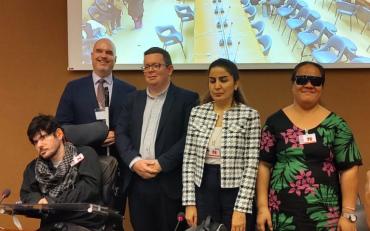On March 16th 2023, the International Disability Alliance (IDA) hosted an event on the sides of the 28th session of the Committee on the Rights of Persons with Disabilities (CRPD).
The event aimed to provide an opportunity for CRPD committee members to hear from global and regional Organizations of Persons with Disabilities (OPDs) regarding the many facets of Article 11 of the CRPD, and covering several underrepresented groups of persons with disabilities. As CRPD committee members prepare to draft a General Comment on Article 11, IDA wanted to ensure the active participation of OPDs, in particular those from the under-represented groups of persons with disabilities, in shaping the normative structure of the General Comment on Article 11.
The event was moderated by Elham Youssefian, IDA’s Humanitarian, DRR and Climate Action Senior Adviser.
To kick off the side event, Marc Workman, CEO of the World Blind Union, delivered opening remarks, emphasizing that emergency responses must be inclusive of persons with disabilities. Workman highlighted the urgent need for a General Comment on Article 11, which can provide guidance to States Parties on their obligations to ensure that emergency responses are inclusive and effective for persons with disabilities. Workman also stressed that OPDs must be recognized as key partners in the implementation of Article 11, and emergency response plans must be the result of an inclusive and participatory process that reflects the diversity of the disability experience.
Further interventions included a reflection on inclusive planning and response for persons with psychosocial disabilities in emergencies, by the Executive Director of Transforming Communities for Inclusion (TCI), Bhargavi Davar. Bhargavi talked about the “legal shackling” of persons with psychosocial disabilities by way of mental health and legal incapacity laws, and their impact on persons with psychosocial disabilities in humanitarian emergencies and disasters. In doing so, she called for the CRPD Committee to consider and provide an expanded and comprehensive definition of ‘disaster’ and ‘humanitarian emergency’ as these are not defined in the text of the CRPD. As well, to understand how, in lack of community development measures, persons with psychosocial disabilities will find themselves in a situation of continued uncertainty and fear, which should be considered as a humanitarian emergency by the Committee.
Fatino Utumapu, Board member of the Pacific Disability Forum, presented findings from a research paper on the impact of climate change on persons with disabilities in the Pacific. The paper presents findings related to the compounded impact of climate change on persons with disabilities in the areas of agriculture and fishing, food security, access to water, and health, showing how it is creating new risks and barriers for persons with disabilities.
Juan Angel De Gouveia, Board Member of IDA and President of RIADIS, used his intervention to present recommended actions on using Article 11 as a tool to enhance protection and inclusion for refugees and forcibly displaced persons with disabilities. Indeed, there are several levels of intersectionality between the 1951 Refugee Convention and the CRPD, and recommendations include encouraging State parties to adopt accessible asylum identification and registration systems to protect and assist asylum-seekers and other persons with disabilities and provide sustainable and appropriate support in addressing all their needs. The recommendations also highlighted the importance of applying the CRPD to asylum procedures and understanding the vulnerabilities and barriers that asylum-seekers with disabilities face.
The event was concluded with an intervention by Juan Corbenas, an advocate and DRG IDA Fellow from Argentina, on the situation of persons with disabilities in armed conflict. Juan highlighted the invisibility of persons with disabilities in armed conflict, and their systematic exclusion from conflict prevention plans, peacekeeping and peacebuilding operations. He also offered a reflection on contributions made by IDA – DRG fellows to the general debate on Article 11, including points on respecting the dignity and rights of persons with disabilities, provision of accessibility and reasonable accommodation measures, respect of rights and access to employment, healthcare and justice in situations of risk and humanitarian emergencies.
The diversity of points raised by speakers highlights the unique and extensive nature of CRPD Article 11 demonstrating requirement of a more robust process to develop the General Comment. Supporting the CRPD Committee has been a top advocacy priority for IDA, same as advocating for equal protection, inclusion, and participation of persons with disabilities and their organizations in emergency preparation and response. Therefore, IDA has been actively engaged in the process of developing General Comment on Article 11, and is planning multiple activities to continue doing this in future.
A strong and comprehensive general comment will have a transforming impact on lives of persons with disabilities around the world who are increasingly experiencing different forms of risk and emergency often left behind in response and recovery efforts.

